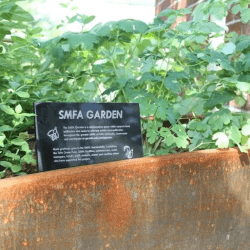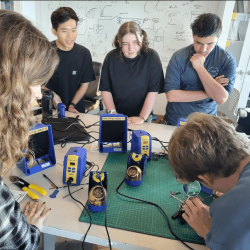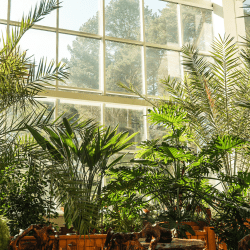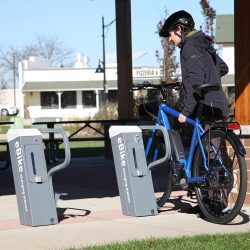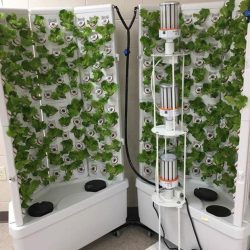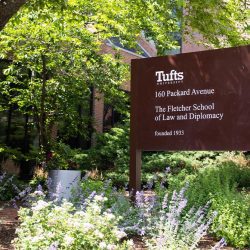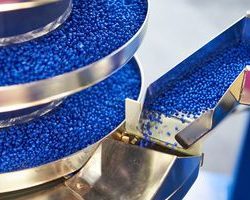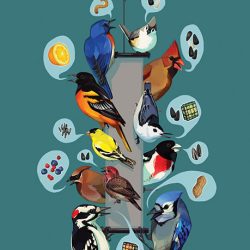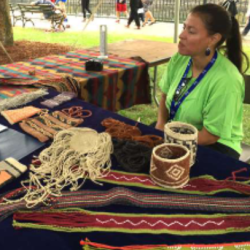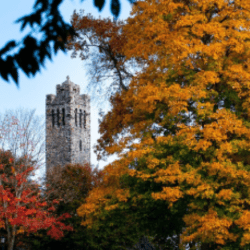Current and On-going Green Fund Projects
The Green Fund was established to benefit the whole of Tufts University. Some previously funded projects are on-going, so check them out below and consider getting involved today!
This project focuses on improving access to water for the Tufts undergraduate student body by installing water bottle fillers on multiple floors within residential buildings to directly impact and improve student health and wellbeing on the Tufts Medford campus.
This project involved the creation of a garden along the east side of the SMFA building, which will be surrounded by a native wildflower habitat to replace the grass and complement the previously funded SMFA pollinator garden. These beds will be used by students and faculty to cultivate sustainable art materials such as pigments for paint, ink, and dye, emulsions for anthotype photography, and fibers for papermaking, spinning, and weaving.
This project supports the installation of workshop tools and marks a crucial enhancement for the club. The space functions as the manufacturing hub for the project's mechanical team, serving as the primary site for fabricating essential mechanical components and integrating both mechanical and electrical systems. The tool installation in the Tufts Solar Vehicle Project Workshop is more than just a logistical update; it is a strategic investment in the educational capabilities of Tufts University. It supports not only the immediate needs of the Solar Vehicle Project but also the broader educational mission of the university, providing a practical training ground for students and a platform for future outreach projects.
The Library Leaf Project aims to transform the Hirsh Health Sciences Library into a vibrant, plant-filled space that enhances user well-being and educational experiences. Responding to consistent feedback from students and patrons requesting more greenery, this project will introduce a variety of indoor plants to create a more engaging and supportive environment. To celebrate the introduction of these new plants, the project team will host a special event at the library. Educational signs will be placed
alongside the plants to provide users with detailed information about each species, including botanical identity, care instructions, and interesting facts.
The Nutrition WINS Program is a pilot initiative designed to introduce sustainable nutrition practices to Tufts University's athletic teams. By focusing on the integration of locally sourced, plant-based foods, and evidence-based nutrition strategies, the program will not only enhance the health and performance of student-athletes but also support Tufts’ commitment to reducing greenhouse gas emissions. The project aims to educate athletes, coaches, and staff on how nutrition can positively influence performance, recovery, and overall health, while fostering environmental consciousness through sustainable food sourcing and choices that contribute to a lower carbon footprint.
This project aims to address Tufts’ restriction of the use, storage, and charging of e-scooters, e-bikes, hoverboards, and other electronically powered transportation devices (e-PTDs) on campus. This project proposes the creation of designated outdoor locations for community members to store their e-PTDs as well as safety guidelines and registration procedures to ensure awareness of the potential dangers of the lithium-ion batteries that power e-PTDs. The e-PTD project will install bike racks and charging stations in the two parking garages on the Medford/Somerville campus, creating a place for Tufts community members who use e-PTDs to safely charge and store their devices. The project aims to complete the installation of the storage and charging locations, registration process, and safety manual by fall 2024.
The Nutrition Security Initiative: Fork Farms at Tufts aims to grow sustainable nutrition at Tufts for graduate students on the SMFA and Boston/Health Sciences campuses. The project, proposed by the team at the Seeding the Future Lab, part of the Friedman School’s Food & Nutrition Innovation Institute, developed from the difficulty of balancing living expenses and healthy food choices for graduate students at Tufts. The team identified the nutritional gap for students at these two campuses in particular, which have limited access to fresh produce items, and will use the “Flex Farm” hydroponic pod systems for indoor growing from hydroponic farming company Fork Farms to produce fresh, nutritious food for students. After the initial set up of the hydroponic systems, the largely self-sustaining pods are estimated to provide an average of 20 pounds of produce per month, which will become available to the hundreds of graduate students on these campuses as well as other members of the Tufts community.
The SMFA Garden initiative, proposed by undergraduate student Abigail Harrison, aims to update the existing SMFA Garden, which was originally supported by the Green Fund in 2020. This project will add planters and plants, develop an educational seeding and planting workshop, and add community signage, making the garden a more identifiable shared area for the community. The updated SMFA Garden will continue to provide a space for native pollinators while creating a more accessible shared green space for students, faculty, and staff in the SMFA community.
This project focuses on the creation of the Fletcher Community Garden on the Medford/Somerville campus. This community garden will create a new gathering space for the Fletcher School’s community on the fourth-floor patio of their building as well as a new community engagement space for meetings and events. The group of staff and faculty members behind the project aim to establish a calming and welcoming space through the implementation of planters with native plants, including herbs and plants that will attract pollinators. In addition to the establishment of plant and soil supplies, the team will also enhance the aesthetic appeal of the community space to create a new, sustainable environment and promote community engagement for Fletcher community members.
This project, proposed by BFA student Yaqi Cai and MS Human Computer Interaction student Matt Ebisu, aims to address the plastic waste from discarded bottles made from PETG, a thermoformable plastic used to make plastic bottles and 3D printing filament, on university campuses. The team will turn discarded plastic bottles into usable 3D printing filament by using an existing open-source design, ultimately providing free fabrication materials for arts and engineering communities at Tufts. The project aims to place the filament fabrication machine in a visible space in the SMFA to encourage community participation in 3D printing, as well as hold workshops to provide training and education about sustainable art practices.
This project increases opportunities for experiential learning for the Tufts community, which is part of the ExCollege mission. It is a direct way for students to not only get experience identifying birds, but learn about community data collection, climate change, and the environment. Project Feederwatch is a citizen science project run by the Cornell Lab of Ornithology, where participants count birds at feeders and collect data which helps scientists track population trends, climate change, environmental factors, and more. On count days, participants come to the count site, are given an introduction to the project and bird identification, and then count birds for as little as 10 minutes or as long as two hours, allowing for flexibility and the ability to participate multiple times. The project runs from November through April and count days occur weekly.
This project will help reduce purchasing costs and overall hazardous waste production at Tufts Cummings School of Veterinary Medicine. Formalin is the most commonly used fixative for diagnostic specimens submitted to the Cummings Veterinary Diagnostic Lab (CVDL). The CVDL must routinely purchase formalin for fixing specimens that require disease diagnosis. However, formalin is a hazardous chemical, and additional cost and effort are required to properly and legally dispose of it. This presents an opportunity for improved sustainability and an educational opportunity, as formalin purchasing and use- associated costs and resources must be utilized continuously to maintain supply and manage disposal. This project aims to reduce total hazardous waste use and disposal by recycling formalin into formalin that is appropriate for re-use. Doing so will encourage and educate our school about ways to reduce the environmental impact of diagnostic and research specimens.
Funded During the 2022-23 Cycle
The Double Arrows project will work with artist Elizabeth James Perry, a member of the Wampanoag Tribe of Gay Head - Aquinnah, to do a restorative planting garden with an emphasis on natural dye plants at the Indigenous Center in conjunction with her solo exhibition at Tufts University Art Galleries. It will extend the Galleries' project into a long-term engagement with the Tufts community through building outdoor container gardens and planters with Native plants conducive to natural dye, weaving and basketry practices. Double Arrows' gardens will continue to be stewarded by the Indigenous Center students through a manageable caretaking plan for the next three years. The group will create one or two container gardens at the Indigenous Center. Perry will do a workshop with students in advance of planting to share natural dye planting and weaving techniques and interested students can join her in the transplanting seedlings to the plot in May 2023. The Green Fund selection committee awarded Double Arrows $5,750 for container planters, facilities needs, seeds, plants, soil, gardening supplies, workshop supplies, an artist honorarium, and student stipends for project management and caretaking.
This project aims to get the Medford/Somerville campus certified as a Tree Campus Higher Education by the National Arbor Day Foundation. This will create opportunities for Tufts community members to get involved with urban forestry and build a support system for maintaining and expanding our canopy while drawing attention to the need for intentional tree protection. Long-term, the team hopes to create opportunities for students to volunteer and intern with the cities of Medford and Somerville. The Green Fund selection committee awarded the team $8,050 to fund trees, Arbor Tree event costs, tree inventory supplies and analysis, t-shirts, and identification signs.

